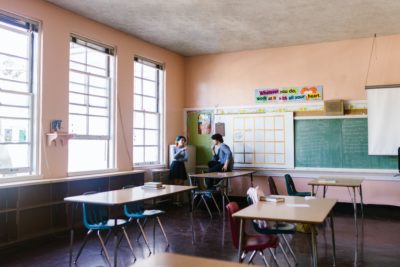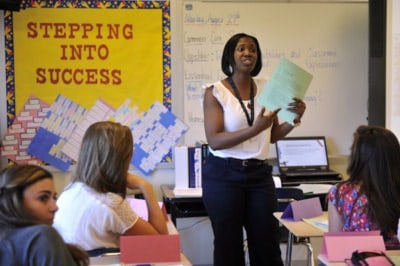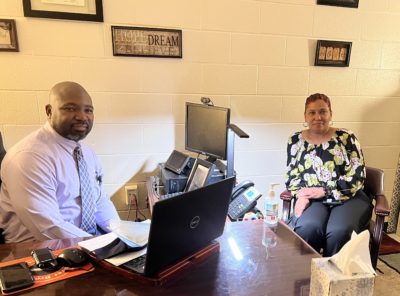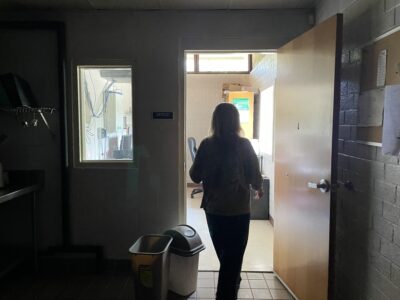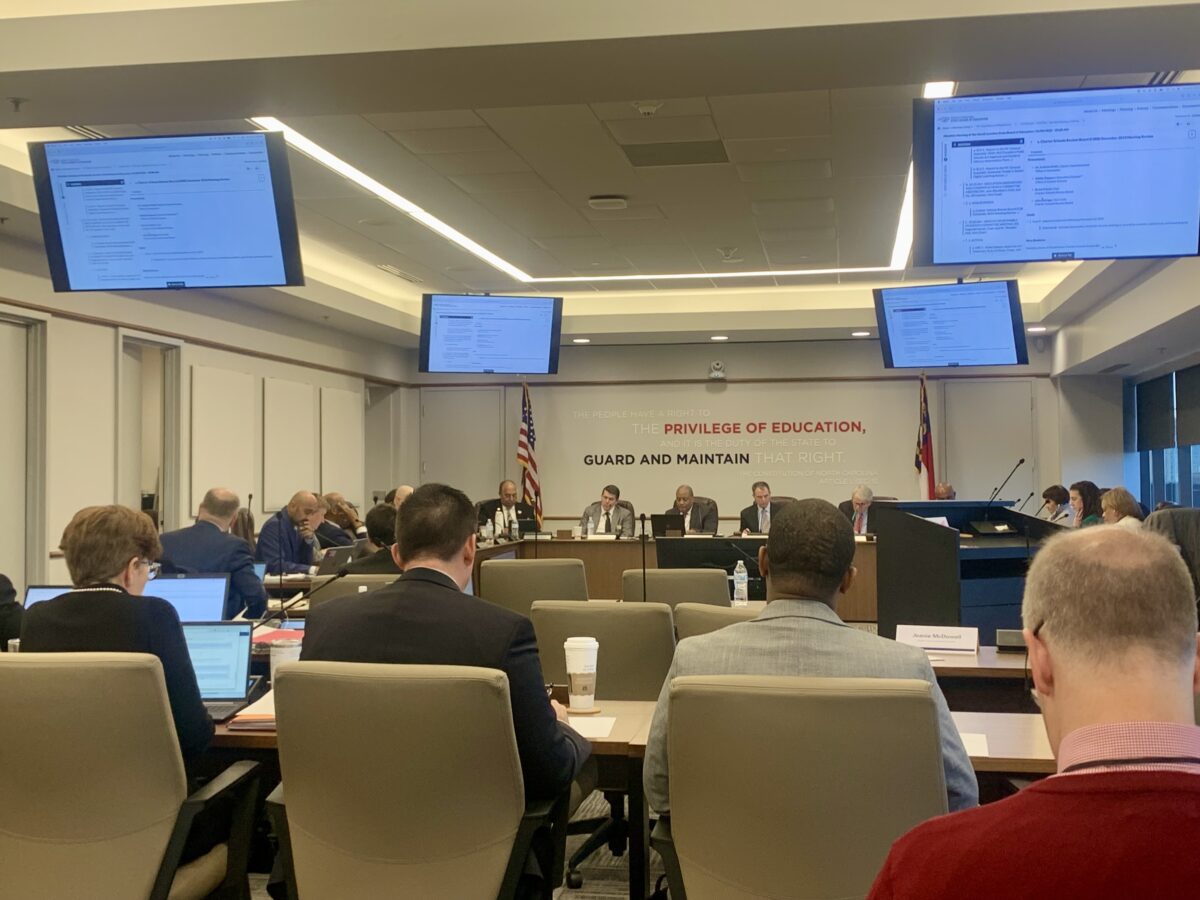
|
|
The State Board of Education spent part of their first meeting of the year brainstorming their priorities for the upcoming 2025 legislative session.
North Carolina lawmakers kicked off their long legislative session on Wednesday, which also means it’s the beginning of a new two-year budget cycle.
The Republican party holds a majority in both chambers of the legislature, but they were one House seat short of a supermajority after the fall election. The supermajority is what allowed the party to override many of the vetoes issued during democratic Gov. Roy Cooper’s tenure.
In the past, the Board has advocated to the General Assembly for things related to public school funding, reworking school performance measures, Medicaid expansion for preventative care, as well as math and literacy support. Here is a look at what they proposed during the 2023 long session.
Calendar flexibility
According to North Carolina law, traditional public schools are not allowed to start the school year sooner than the Monday closest to Aug. 26 and end later than the Friday closest to June 11. The problem with this law, according to school districts, is that the dates are not flexible enough for them to meet the needs of their communities.
Darrell Pennel, who serves as the Board’s local board of education advisor, said that the school calendar should align with the community college calendar so that students have exams before break.
The Board’s student advisor, Ian House, said that having more calendar flexibility would benefit high school students in Advanced Placement (AP) courses. AP exams often take place at the end of May– a whole month before school lets out for the summer. This leads to a lame-duck period where students can feel unmotivated, House said.
Even without considering AP exams, House said that students have been “straining, stressing, and complaining” about having a two-week holiday break between classes and then returning to exams at school right after.
“I mean, how is that allowing us to truly enjoy our day, enjoy our break, our joy, our time off?” House said.
Teacher retention
Board members had several ideas related to supporting teacher retention, including the restoration of master’s pay, more professional development, and more mentoring and mental health support.
Heather Smith, who sits on the Board as 2024 Burroughs Wellcome Fund Teacher of the Year, suggested that there should be more advanced teaching roles.
“I think that our teachers need to take on that leadership, especially if administration is not the route that they want to take and they want to be a voice and a teacher leader,” Smith said.
Kimberley Jones, the Teacher of the Year for 2023, mentioned the teacher pay scale.
“It is outstanding that our beginning teachers come in with a higher salary, but those of us in the middle, restoring master’s pay, continuing to provide for professional development, and recognizing that via compensation is critical,” Jones said.
Student health
The Board discussed concerns they had around student nutrition and the mental health of students and teachers. Remedies mentioned were universal free school lunch for Title I schools and hiring more school counselors and psychologists.
“We must continue to understand the nonacademic problems that our kids are suffering from,” Board member Reginald Kenan said.
Smith spoke to the need for mental health support for students impacted by Hurricane Helene in western North Carolina.
“I think even if we’re not thinking about funding, we just need to think about the human beings that are there, that are displaced and having to go through this winter season,” Smith said.
Eric Davis, the Board’s chair, said there is a tie between the need for school counselors and psychologists and reinstating master’s pay.
“If you get a masters in social work, you can do therapeutic counseling,” Davis said.
Recommendations from principals
On behalf of the North Carolina Principal of the Year Network, Donna Bledsoe and Patrick Greene gave a presentation of the group’s legislative and policy priorities.
The first recommendation to the Board was to tie principal pay to the highest point on the teacher pay scale plus 25%. By doing so, it will ensure that the principal is the highest-paid person in the building and maintain a balance between teacher and principal salary.
“You currently have situations where assistant principals have to be held harmless to take a promotion to a principal because they would be paid higher as an assistant principal,” Greene said.
Bledsoe and Greene said that the complexity of running a particular school and principal experience should factor into pay as well.
Protections for bonuses and protection from pay cuts were also recommended to the Board.
The next priority presented was reforming the School Performance Grade System. The network wants to retain end-of-grade (EOG) and end-of-course (EOC) measures, increase the value of meeting/exceeding growth targets, add additional indicators based on school administrator feedback, and revise the definition of a low-performing school to exclude those that meet their growth goals. They also suggested adding more value to “meeting or exceeding” student growth targets.
“We’ve known for a long time this isn’t adequate to grade schools,” Greene said. “If a school is meeting growth that is not a low-performing school.”
Another prong on the list of recommendations was establishing a Beginning Principal Support Program, similar to the Beginning Teacher Support program.
The network envisions that this will provide mentorship and professional development for first-time principals during their first two years on the job.
Beckie Spears, a principal from Wilkes County and 2024 Wells Fargo North Carolina Principal of the Year, said the support of the network can help since the principalship can be a “lonely job.” Spears and the other presenters also clarified for the Board how the mentorship program would be different from the North Carolina Principals’ and Assistant Principals’ Association.
“And so the idea is to create a network of support, not necessarily an organization of support, but a true network of people who are colleagues, supporting each other, advocating for other colleagues in our field,” Spears said.
Lastly, the presenters proposed establishing a Principal Working Conditions Survey and state funding for a minimum of one assistant principal per school along with an additional assistant principal for every 500 students.
“The current state allocation is one assistant principal for 985.3 students,” Bledsoe said. “So you understand that that’s not equitable across districts across the state that lends itself – and I know Becky feels this a little in Wilkes County, too, to elementary schools being without principals, but the school complexity is still there, and so that is one of our funding questions as well.”
The Board plans to filter and take up the discussion of their legislative priorities again at a February meeting. A quick review of their past priorities can also be found in this presentation.




